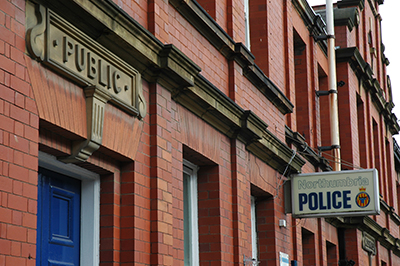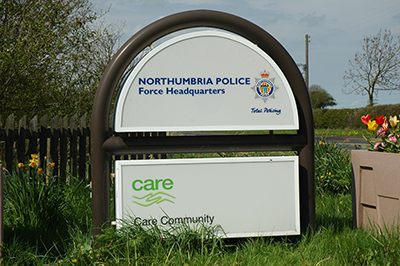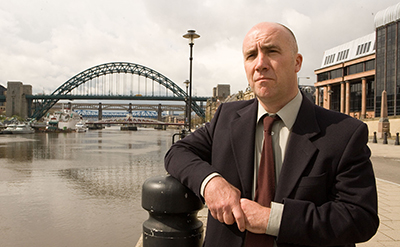A Law Unto Themselves:
How Northumbria Police Keep Us In The Dark
IT’S a Sunday morning and a woman is walking along a lane in the town of Washington, near Sunderland. A man suddenly grabs her and holds her in a bear-hug, as he struggles to undo his trousers. The woman escapes and tells police what has happened.
For many years, police have released details of such crimes to the media. Through doing so, they hope a description of the culprit helps catch him. If not, it at least warns other women to be on their guard.
And so Northumbria Police released details of this crime – two weeks later ! Likewise, with another disturbing crime which happened the night before. A man in a skeleton mask and armed with a knife terrified staff in a bookies in Gateshead.
Again, another crime you’d think the police would want to solve quickly. Again, the sort of incident you would hope they would tell the media about. And so they did – two weeks later !
The common factor is that both crimes happened on a weekend, when Northumbria Police do not staff their press office. When the force spends nearly £700,000 a year on its PR department, it is appalling that such gaps occur. I am told senior officers are obsessed with Home Office mantras about reducing the “fear of crime”.
The logic seems to be that, if the public are not told about crimes, they will not have anything to worry about.
When a horrific crime is released, it is followed by acres of quote about how “rare” such offences are.
 Public interest….how much should police tell the people they serve?
It is bad enough that police officers see it as their job to censor news.
But it is appalling that so many journalists sit back and let it happen.
Public interest….how much should police tell the people they serve?
It is bad enough that police officers see it as their job to censor news.
But it is appalling that so many journalists sit back and let it happen.
Since the late 1990s, I have campaigned for Northumbria Police to be more open with the media. At first, the response was: “It’s up to us when we release crimes.” The arrival of a new chief constable three years ago provided a glimmer of hope. I had several meetings with Mike Craik, who arrived from the Met with a more enlightened attitude.
He admitted the force had a culture of secrecy and vowed to change it. But, sadly, his message has been slow to filter down. As a freelance, I work most Saturdays. Yet, if you listen to the police voicebank, you would think that one of Britain’s busiest forces has no crime between Friday and Monday.
On one weekend, the voicebank was not updated at all for nearly 72 hours. After submitting a Freedom of Information request, I discovered there had been no fewer than 5,083 incidents – including 45 classed as “serious”. These included the death of a teenage girl who fell from a tower block, a 74-year-old man beaten senseless by thugs armed with a plank and a missing hospital patient found washed up on a beach.
None of these stories was deemed important enough to release to the media. I complained to the chief constable and the force carried out a review of its media operations. A “media consultant” was brought in at a cost of £5,633 (the figure provided courtesy of another Freedom of Information request). The head of the press office retired from her £60,000-a-year post last year.
She was replaced by another PR expert who, again, talked about improving the service. And so, it was frustrating to find that, after the Christmas and New Year holidays, the force released a trickle of crimes that had happened weeks earlier. The attack on the woman in Washington and the armed robbery in Gateshead were just two examples from a long list. And, of course, these were just the ones they bothered to tell us about at all.
 Sign of the times….the force holds back crimes from the media.
Sign of the times….the force holds back crimes from the media.
I felt another Freedom of Information request coming on. I soon discovered that, over the Christmas and New Year period, Northumbria Police dealt with 17,261 incidents. These included 13 very serious attacks, encompassing murder or attempted murder and other particularly violent assaults. There were also 20 sexual offences, of which seven were rapes.
Finally, there were 37 robberies and 44 arson attacks. Yet, out of those 17,261 incidents, Northumbria Police decided the public should only be told of 27 - many of them released a long time later. Not only is this sticking two fingers up at the media – and thus the public - it is also letting the police themselves down. What is the point of appealing for witnesses or warning the public weeks later ? One of the examples I came across a few years ago involved a boy being sexually assaulted by a man in a park.
Several weeks later, another child fell victim. Neither crime was released to the media and we only found out because a school sent letters out warning parents. I believe it is only a matter of time before the force is sued as a result of not warning the public. The force now tells me it plans to soon open its press office on weekends, although it will require extra resources. Let us hope that, after all these years, this department can finally justify the near £700,000 it costs to run.
* Since this article appeared in the journalists’ newspaper Press Gazette, Northumbria Police has started staffing its press office at the weekend. However, the force has also written to Nigel, refusing to reveal why the crimes he highlights are held back. Deputy Chief Constable David Warcup claims such crimes are not released for “operational reasons” and he does not have to “justify” such decisions. Nigel said: “I’ve been a journalist for 23 years and I am fully aware that, occasionally, details of crimes do genuinely have to be held back for operational reasons. “However, such incidents used to be very rare and there is no way that excuse can be valid for the huge number of crimes I have highlighted.” Nigel intends to continue his campaign for Northumbria Police to stop hiding details of crimes from the public. He said: “There’s a risk I may come across as being anti-police, which I am not. “Frontline officers do a difficult and dangerous job. The ones I talk to are also sick of the PR spin and the way the public are misled.”
<-----
